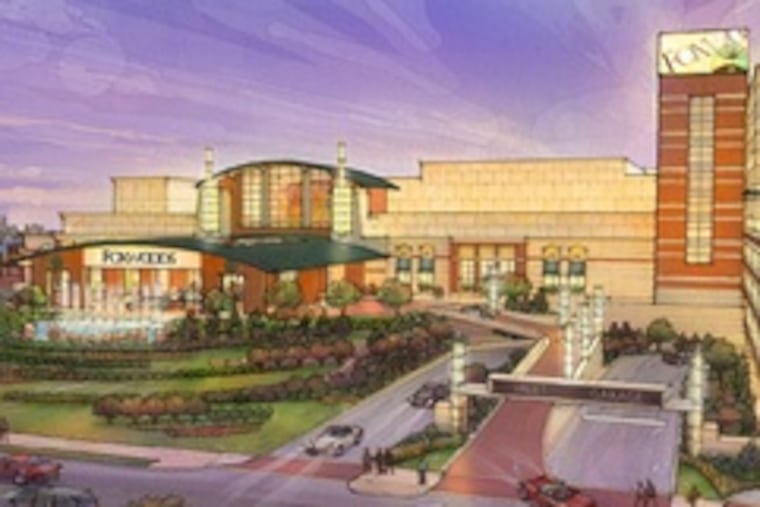Delays of casinos costing millions
The Gaming Control Board says Pa. is losing $990,000 in taxes each day opening of the sites is postponed.

Legal and political delays in opening Philadelphia's two waterfront casinos are costing about $1.8 million a day in gross slots revenue, according to a state gaming official.
Targets for the casinos' openings have been pushed back about a year because of fervent neighborhood opposition, disputes over riverbed construction rights, and jurisdictional squabbles.
Meanwhile, Pennsylvania, which gets a 55 percent cut of the two slots parlors' take, stands to lose about $990,000 in tax revenue for every day the openings are delayed, according to the state Gaming Control Board.
The city loses $72,054 a day, or at least $26.3 million a year, from its share of the casinos' tax take.
The figures do not count the expenses the city and state will incur to host the casinos.
Casino advocates lament the delays.
"This is the reason why the legislature brought in regulated gaming - to generate revenue," board chairwoman Mary DiGiacomo Colins said last week in her Conshohocken office. "We can attribute a lot of the success in terms of revenue creation for Pennsylvania from our ability to bring these other casinos so quickly online."
Colins said Pennsylvania continued to lose gambling dollars to neighboring states, such as New Jersey and New York, with the impasse in Philadelphia.
Six slots parlors, including Philadelphia Park in Bensalem and Harrah's Chester Casino & Racetrack in Delaware County, are fully operational.
In addition to tax revenue, there are host fees, pilot payments, and other fees to the city, said Joe Grace, a spokesman for Mayor Street. "You are looking at $85 million to $90 million over the course of the five-year financial plan," he said. "So we support gaming as a significant economic tool for the city of Philadelphia, and support it to move forward."
The Pennsylvania Race Horse Development and Gaming Act was passed in July 2004 and signed into law by Gov. Rendell. It authorizes up to 61,000 slot machines in 14 venues throughout the state.
SugarHouse Gaming and Foxwoods Development Co. L.L.C. were awarded the two city slots licenses almost one year ago, on Dec. 20, 2006, by the gaming board.
On Dec. 3, the Pennsylvania Supreme Court ordered City Council to give SugarHouse all the necessary permits and approvals to begin construction immediately.
"We're excited to start construction and move the project forward," SugarHouse chief executive officer Greg Carlin said Friday. He said groundbreaking for the casino planned for North Delaware Avenue at Shackamaxon Street could begin as early as next month.
Foxwoods is seeking similar relief from the state's highest court for its planned casino at Columbus Boulevard between Tasker Avenue and Reed Street in South Philadelphia. It filed for a rehearing Tuesday.
"We're encouraged by the Supreme Court's decision," said James Dougherty, general manager of Foxwoods Casino Philadelphia. "We believe the circumstances that were outlined in the SugarHouse opinion also apply to us."
Combined, the two slots parlors by SugarHouse Gaming and Foxwoods are expected to generate $658.3 million a year, based on each casino having at least 3,000 slot machines, according to their gaming-license applications.
SugarHouse Gaming is controlled by Chicago billionaire developer Neil G. Bluhm.
Foxwoods Development Co. L.L.C. is run by the Mashantucket Pequot Tribal Nation, the tribe behind the Foxwoods Casino Resort in Ledyard, Conn.
In addition to lost revenue, SugarHouse Gaming says the delays have cost it $130 million in interest expenses, preopening costs and legal fees. Foxwoods claims a hit of $80 million for the same expenses.
"Every day that we're delayed, our costs go up," said Carlin, a former investment banker.
"Every day that we're not opened is a day that we're not generating any income."
Carlin said SugarHouse's interim facility, with 1,500 slots, was slated for a July 2009 opening - instead of in early 2008, when it had first been planned.
Foxwoods originally had anticipated a November 2008 opening. Dougherty said his team was now budgeting for a 22-month construction schedule from when and if ground was broken. Foxwoods had planned to break ground in April 2007.